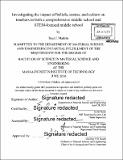Investigating the impact of beliefs, norms, and culture on teachers in both a comprehensive middle school and STEM-focused middle school
Author(s)
Madera, Raul J
DownloadFull printable version (3.303Mb)
Other Contributors
Massachusetts Institute of Technology. Department of Materials Science and Engineering.
Advisor
Justin Reich.
Terms of use
Metadata
Show full item recordAbstract
Teacher perception of control, teacher beliefs, and school culture are important variables in shaping a STEM classroom. This pilot study explores the connectedness of classroom practice, teacher perceptions, and school culture through observational case studies of two classrooms, one in an urban public school and another in a suburban private school. Evidence including classroom observations, teacher interviews, and examining documentation was evaluated by using an established observation protocol called the Reformed Teaching Observation Protocol, or RTOP (Sawada, Pibum, Judson, Turley, Falconer, Benford,, & Bloom, 2002). Interview data suggests that both teachers had similar perceptions of effective STEM education, yet their classroom practice was very different. While teacher's perceptions were similar, the school culture as portrayed by the school websites and documentation was very different. The urban public school was focused on student character development and standardized test preparation, while the suburban private school focused more on fostering student thinking. This small glimpse into the relationship between beliefs, practice, and norms could suggest that different school cultures may influence the teachers' practices.
Description
Thesis: S.B., Massachusetts Institute of Technology, Department of Materials Science and Engineering, 2016. Cataloged from PDF version of thesis. Includes bibliographical references (pages 31-33).
Date issued
2016Department
Massachusetts Institute of Technology. Department of Materials Science and EngineeringPublisher
Massachusetts Institute of Technology
Keywords
Materials Science and Engineering.